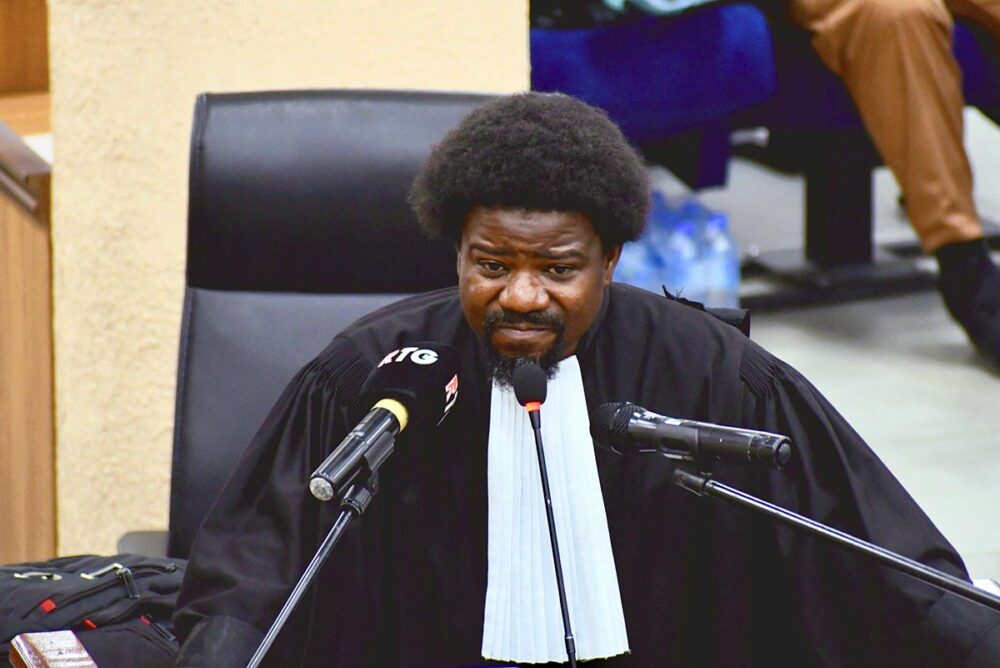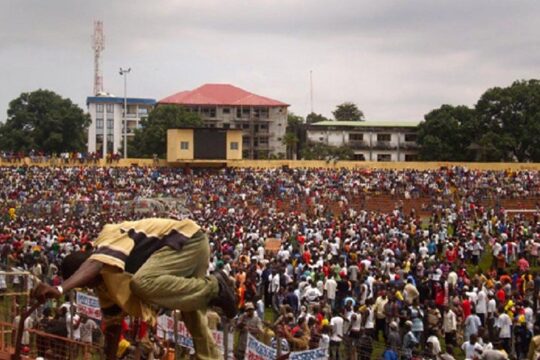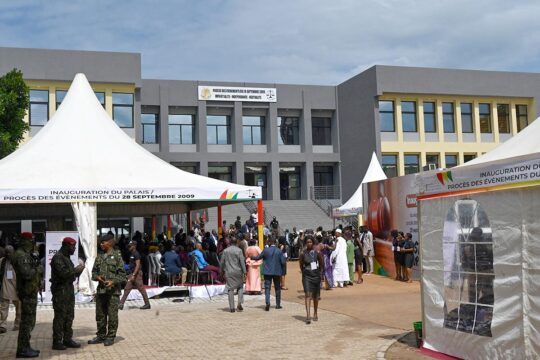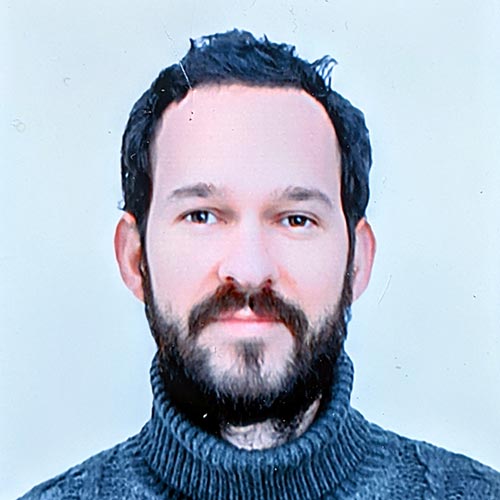A brand new boubou or a new, three-piece suit – the defendants’ outfits are the main thing that changes as the days pass in similar fashion in the last stage of the September 28 massacre trial. On trial for the past 21 months, eleven defendants -- a former head of state and senior members of the regime he headed after a coup - have been charged with the repression of an opposition rally in a Conakry stadium on 28 September, 2009. The bloodbath left more than 150 people dead and more than 100 women were raped.
The defence case began on May 27, 2024. Around 20 lawyers are representing the accused. Some 15 of them have already taken the stand. Salifou Béavogui, lawyer for warrant officer Mamadou Aliou Keita, was one of the first to be called by the presiding judge. Facing the magistrates with his back to the audience, the lawyer denied the charges against his client. According to him, his client did not rape Dame Aissatou Barry, one of the emblematic victims in this case. “There’s a mistake about the person. She must have seen Mamadou Aliou Keita from a distance. But in any case, it cannot stand up in court, in a criminal court. One person’s word against another, it won’t stand up, that’s not possible. Mamadou Aliou Keita will be acquitted,” he claimed, foreshadowing the defence line of other lawyers who all plead their clients’ innocence.
This was followed by a plea from the lawyer for Blaise Goumou, a former member of the special services considered to have implemented the killing. The gendarme is suspected of having taken part in the stadium massacre, and the prosecution has requested a life sentence against him. Counsel Yaramo-Cé Saolomou’s argument developed several themes that his colleagues later continued to explore. He denounced as illegal the reclassification of the facts as crimes against humanity. The prosecution has requested this, and the court has decided to rule on it only at the time of the verdict. Some of the lawyers consider the reclassification to be “opportunistic” and, in their view, indicative of the lack of evidence in the case. “The prosecution should have the courage, the intellectual and even professional honesty to acknowledge its failure. The law provides the right to request a defence when you find that there is no evidence of any kind to establish the guilt of the accused,” declared Saolomou in a peremptory tone.
Victims accused
Faced with a case that they consider insufficiently solid, many lawyers argue that convicting their client would be the result of a “witch-hunt”. Some refer to the trial of Laurent Gbagbo and Charles Blé-Goudé, the former Ivorian president and youth minister who were tried and acquitted before the International Criminal Court (ICC). “Just as the judges of the International Criminal Court were guided solely by the law in restoring the historical truth through the acquittal of these two defendants, you can do the same, Mr President,” Saolomou told the presiding judge. He further backed his argument by bringing up the taboo in this unprecedented trial of an ethnic dimension to the case. “There are some who think that this trial is directed against a community,” he said, suggesting that a conviction would confirm this opinion. “The court’s decision must not be influenced by any communitarian, ethnic, regionalist or religious purpose.”
In the same vein Pépé Antoine Lamah, lawyer for Moussa Dadis Camara who was head of State at the time of the massacre, denounced the trial as political. “Since we have to judge for the sake of judging, and possibly hand out sentences in line with a political plan that some see as part of national reconciliation, that’s why we’re putting up with all this. Otherwise, if we want to have a serious trial, we should look for those who are really responsible,” he said. He accused certain victims of having lied, of having enriched themselves, giving the example of Avipa, the association of victims, relatives and friends of September 28. “Ask this NGO to draw up a balance sheet of its activities from 2010 to the present day, and you'll see billions! While the real victims are suffering, others are pocketing billions, building houses and sending their children to top schools abroad,” he claimed. But these attacks on the civil parties were taken to the extreme by another of Dadis’s lawyers, Jean-Baptiste Jocamey Haba.
The conspiracy theory
He broke all records, monopolising the floor for more than three days. On the stand, he went over the case in minute detail, developing the conspiracy theory as never before. According to him, the massacre was organised by Dadis’s enemies to topple him. They saw him as an obstacle to “the predators of the Guinean economy”, because he had attacked drug traffickers, corruption and Western interests. On June 18, during his second appearance on the stand, the lawyer went even further. He denounced the role played, he said, by France, and named the personalities who would have had an interest in eliminating Dadis: Bernard Kouchner, then French Minister of Foreign Affairs, French President Nicolas Sarkozy and the Guinean opposition figure Alpha Condé.
The theory was developed, combining proven facts -- the long-standing friendship between Kouchner and Condé -- with mere supposition. The lawyer sees Condé's departure the day before the demonstration as proof of his involvement. “He knew a massacre was going to take place and went to seek refuge abroad,” said the lawyer. Counsel was repeating rumours that have been circulating for years in Conakry, without providing any further evidence. According to these rumours, Guinean political leaders and their allies deliberately organized their rally to provoke the massacre and destabilize Dadis. This is a line of argument often heard from the defence at the trial. These political leaders were allegedly responsible for the bloodbath that they had provoked. In this game of reversal, the lawyer blames the victims for the crime.
Will the trial be able to finish before the August recess, as the presiding judge hopes? Everything will depend on the last defence lawyers appearing. Half a dozen of them have not yet pleaded, including counsel for Aboubacar Diakité (“Toumba”), Dadis’s former aide-de-camp, who accuses his former boss of having ordered the massacre. Responding to Haba, they may decide to take the stand for an extended period to balance out the speaking time.








